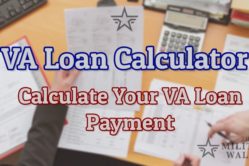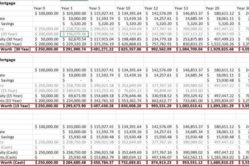Buying a home can be an expensive and confusing process. One of the most confusing topics concerns the number of fees, and who pays them. Some of the fees you will hear discussed include origination fees, document fees, real estate agent fees and closing fees. The VA actually has special rules regarding closing costs for VA Loans.
We recently discussed VA Loan funding fees, which are required of all veterans buying a home through a VA Loan, with the exception of those who receive a service-connected disability payment from the VA (or would receive it if they weren’t receiving retirement pay), and a surviving spouse of a veteran who died while in service, or of service-connected disabilities.
While that covers funding fees, it doesn’t cover all the associated VA Loan closing costs and fees you may be required to pay. Let’s cover a few other closing costs and fees home buyers using the VA Loan might experience.
VA Loan Closing Costs

The VA has strict rules regarding which fees veterans are required to pay, and which fees are considered non-allowable. Those fees which are considered “reasonable and customary” by each local VA office are considered allowable, otherwise, they cannot be charged to VA Loan borrowers and are generally paid for by the seller. If you are applying for a VA Loan, you should be aware that some, or all, of the following fees may be applicable to your VA Loan application. Additionally, the lender may charge a fee equal to 1% of the loan, which can be used to cover expenses not on the following list:
- VA Loan Closing Fees. These are generally minimal if non-existent, and are often rolled into the purchase price of the house.
- VA Loan Funding Fees. Unless you are exempt, VA Loan funding fees are required by federal law.
- VA required inspections and appraisals. The VA requires certain home inspections to be performed before they will fund the loan. The house must be in good repair, must match the description on all documentation, and it must appraise for the sale price or higher.
- Credit report and score. This is charged by the lender, and is required. You can expect to pay around $15-$40 for this, but be sure to get it in writing before agreeing to pay – anything over $40 is excessive.
- Title Insurance. This is essential, especially in our current economy to protect your investment.
- Flood zone determination. Your lender will require you to carry flood insurance if your new home is in a flood plain or flood hazard area.
- Survey. If required.
- Taxes and assessments. Home buyers may be required to pay a portion of taxes or other assessments based on federal, state and local laws.
- Recording fees, documentation fees and postage. Some lenders charge a variety of documentation and mortgage preparation fees. Be sure to get an itemized list in writing before going to closing so you have a good idea of what you are being charged and whether or not the rates are reasonable.
Additional VA Loan Closing Fees
As mentioned above, the VA has strict rules regarding which fees cannot be charged to veterans. These fees are generally covered by the lender out of the flat 1% fee.
- Documentation fees
- Postage
- Notary fees
- Mortgage assignment and transfer paperwork
- VA Loan application fees
You should be aware that many of the fees associated with a mortgage are negotiable and should be discussed in advance of closing. Always review any associated fees and question them if you are in any doubt regarding the nature or cost of the fees.

Equal Housing Opportunity. The Department of Veterans Affairs affirmatively administers the VA Home Loan Program by assuring that all Veterans are given an equal opportunity to buy homes with VA assistance. Federal law requires all VA Home Loan Program participants – builders, brokers and lenders offering housing for sale with VA financing – must comply with Fair Housing Laws and may not discriminate based on the race, color, religion, sex, handicap, familial status, or national origin of the Veteran.




About the comments on this site:
These responses are not provided or commissioned by the bank advertiser. Responses have not been reviewed, approved or otherwise endorsed by the bank advertiser. It is not the bank advertiser’s responsibility to ensure all posts and/or questions are answered.